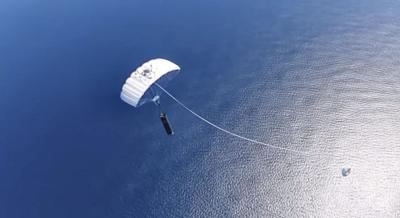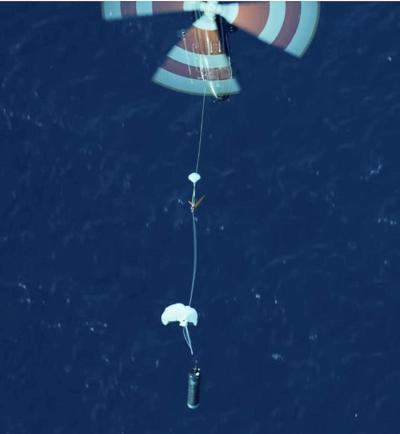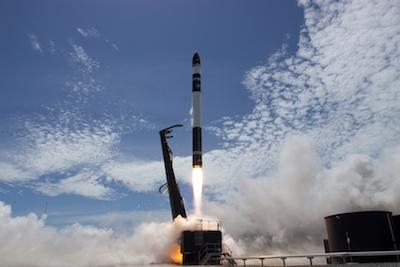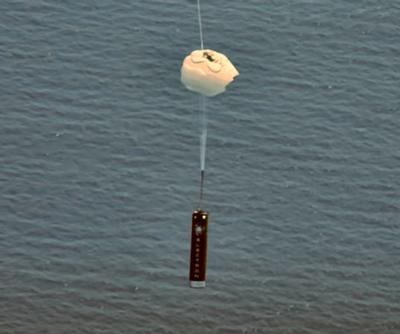Mon, Apr 13, 2020
Successful Test Brings Company Another Step Closer To Reusable Launch Vehicle
Rocket Lab has successfully completed a mid-air recovery test – a maneuver that involves snagging an Electron test stage from the sky with a helicopter. The successful test is a major step forward in Rocket Lab’s plans to reuse the first stage of its Electron launch vehicle for multiple missions. The test took place in early March, before ‘Safer at Home’ orders were issued and before New Zealand entered Alert Level 4 in response to the COVID-19 situation.

The test was conducted by dropping an Electron first stage test article from a helicopter over open ocean in New Zealand. A parachute was then deployed from the stage, before a second helicopter closed in on the descending stage and captured it mid-air at around 5,000 ft, using a specially designed grappling hook to snag the parachute’s drogue line. After capturing the stage on the first attempt, the helicopter safely carried the suspended stage back to land.
The successful test is the latest in a series of milestones for Rocket Lab as the company works towards a reusable first stage. On the company’s two most recent missions, launched in December 2019 and January 2020, Rocket Lab successfully completed guided the re-entries of Electron’s first stage. Both stages on those missions carried new hardware and systems to enable recovery testing, including guidance and navigation hardware, S-band telemetry and onboard flight computer systems, to gather data during the stage’s atmospheric re-entry. One stage was also equipped with a reaction control system that oriented the first stage 180-degrees for its descent, keeping it dynamically stable for the re-entry. The stage slowed from more than 7,000 km per hour to less than 900 km by the time it reached sea-level, maintaining the correct angle of attack for the full descent.

Rocket Lab founder and chief executive, Peter Beck, says the successful mid-air recovery test is a major step towards increasing launch frequency by eliminating the need to build a new first stage for every mission.
“Congratulations to the recovery team here at Rocket Lab on a flawless mid-air recovery test. Electron has already unlocked access to space for small satellites, but every step closer to reusability is a step closer to even more frequent launch opportunities for our customers. We’re looking forward to pushing the technology even further this year and bringing a flown stage back to the factory.”
The next phase of recovery testing will see Rocket Lab attempt to recover a full Electron first stage after launch from the ocean downrange of Launch Complex 1 and have it shipped back to Rocket Lab’s Production Complex for refurbishment. The stage will not be captured mid-air by helicopter for this test, but will be equipped with a parachute to slow its descent before a soft landing in the ocean where it will be collected by a ship. This mission is currently planned for late-2020.



More News
Aero Linx: Model Aeronautical Association of Australia MAAA clubs are about fun flying, camaraderie and community. For over 75 years, the MAAA has been Australia’s largest fl>[...]
Touchdown Zone Lighting Two rows of transverse light bars located symmetrically about the runway centerline normally at 100 foot intervals. The basic system extends 3,000 feet alon>[...]
“Discovery and innovation are central to our mission at Virgin Galactic. We’re excited to build on our successful record of facilitating scientific experiments in subor>[...]
How To Get A Story On Aero-TV News/Feature Programming How do I submit a story idea or lead to Aero-TV? If you would like to submit a story idea or lead, please contact Jim Campbel>[...]
Student Pilot Reported That During Rotation, “All Of A Sudden The Back Of The Plane Kicked To The Right..." Analysis: The student pilot reported that during rotation, “>[...]
 ANN's Daily Aero-Linx (05.02.24)
ANN's Daily Aero-Linx (05.02.24) ANN's Daily Aero-Term (05.02.24): Touchdown Zone Lighting
ANN's Daily Aero-Term (05.02.24): Touchdown Zone Lighting Aero-News: Quote of the Day (05.02.24)
Aero-News: Quote of the Day (05.02.24) ANN FAQ: Contributing To Aero-TV
ANN FAQ: Contributing To Aero-TV NTSB Final Report: Cirrus Design Corp SR20
NTSB Final Report: Cirrus Design Corp SR20







